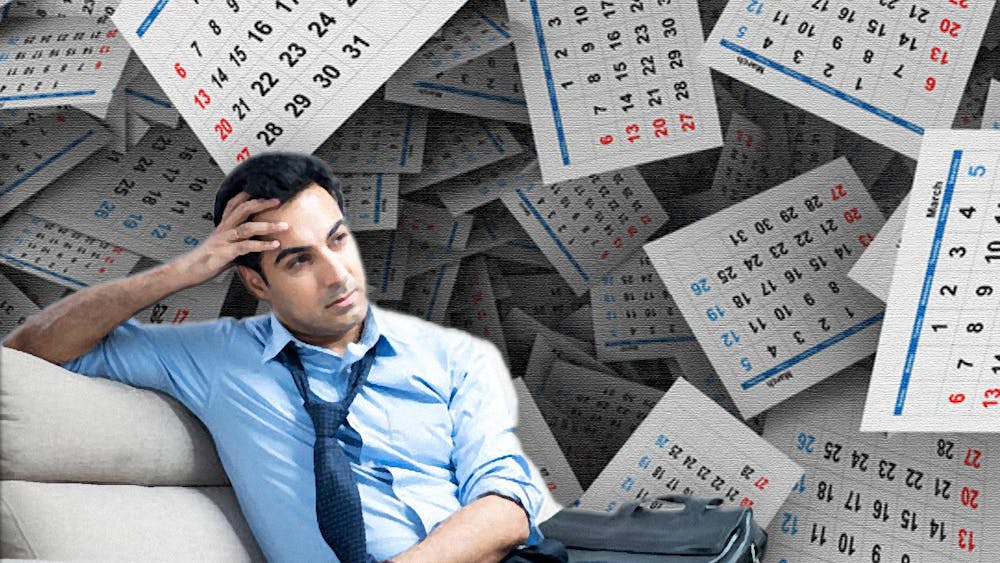There is a 10-foot rat at the corner of South Bend Avenue and Howard Street. That’s right on the boundary between Notre Dame’s off-campus real estate and the rest of South Bend. After a few passes, it’s not that scary. But it stands in the shadow of a 100-foot pile of dirt whose tyrannosauric footprint seems to have provoked at least one townie’s resistance to the University’s uncontainable property creep. In the background, a polished and busy Eddy Street Commons announces with neo-colonial brick, “God, Country, Notre Dame.” So in the span of one red light, the conscientious observer sees a miserably inverted triad: Notre Dame’s real estate ambitions, hunk of earth, 10-foot rat.
But there’s something unfair about this characterization of Notre Dame. Let us attempt, in all earnestness, to understand our school’s situation.
Notre Dame’s niche in the marketplace of major U.S. universities is not a safe one. Its mission, to be at once a major research institution and a Catholic University, disqualifies it from the usual securities. Georgetown University and the Ivies downplay their Christian charters to attract top students. State schools rely on government funding to insulate academic research against the seasons of economic influence. Unable to avail itself of these resources, and encompassed by a 20th century city of tottering economic promise, prudence leaves Notre Dame no other measure. They must expand or die.
“But must they expand?” you ask. “Isn’t it enough that they have guarded their piggy bank with an architectural fortress? Isn’t it a bit ridiculous to suggest that a $13 billion endowment needs a South Bend real estate business to survive?” Nay, It may not even be enough. We do not appreciate the sort of economic raft required to stay afloat in these tempestuous amber waves of grain, where God is forced out of public discourse just as intellectual rigor is dragged from the churches, and the winds of supply and demand beat all dissenters into compliance.
You don’t believe me? Why is it that, after Notre Dame, the next most competitive college that hasn’t seriously scaled back its religious identity is ranked as low as 46th? And who knows what influence SoCal beaches had on Pepperdine’s U.S. News and World Report ranking committee? It is not for want of principled schools — Notre Dame is an economic anomaly. It is the lone Catholic on the cutthroat playground of American higher education, and it has earned that position through loyal alumni and shrewd fiscal maneuvering.
“But what place does a Catholic have in such a cutthroat playground?” The only way to change unfair 4-square rules is to beat the game. Of course you can call the pre-teen despot “unfair” and run along to play with your more reasonable friends, but Notre Dame’s mission cannot be content paddy-caking with Benedictine College and Franciscan University. So Notre Dame’s mission, to announce the Catholic truth to the popular kids, requires it to beat the economic game even as it aims to reform that very game. It must constantly find new sources of revenue to make professorial tenure more competitive. It cannot be too cunning, it cannot be too judicious in dressing itself up in such a way that will earn the respect of Yale and Harvard. And if South Bend is a tad tidier as a result of these cosmetics? Well, we can just call that an expression of ND’s Catholic identity.
Notre Dame cannot do it all. At some point, its mission to be the best must conflict with its courtesies for its host-city. But what is the conscientious observer to think? We can acknowledge the university’s good will and do our part to be good citizens to South Bend, even when Notre Dame’s attention must be fixed elsewhere. But Notre Dame will trumpet these acts of charity as branches of its own magnanimity. It has to; not out of hatred, but for its image. Thus, the innocent volunteer becomes part of the method of the University’s unfairness.
Alternatively, for those who do not wish to advance unworthy causes: we can rebel. We can inflate more rats to raise awareness of systematic oppression. We can get our hands dirty — what those innocent volunteers refuse to do — by besting Notre Dame at its own advertising campaign. But this option is really no better. To make a rat out of Notre Dame is to follow precisely in its Machiavellian footsteps. The very thing we would be protesting (a university that causes local grievances to enact a national good) we would in fact do by entering a smear campaign to bring about a civic good. Either way, we do not really change our world for the better. To volunteer is to submit to the system; to villainize is to be a disciple of the system. Conscience, then, lay somewhere in the indefinite, dirty middle between that inflatable rat and Eddy Street Commons.
Rats and real estate
The views expressed in this column are those of the author and not necessarily those of The Observer.









